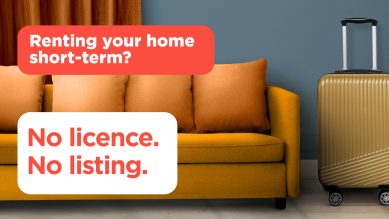The City is working to ensure short-term rental operators are licenced and following City by-laws through increased education, enforcement and penalties.
November 5, 2025
This includes increasing penalties for operators who violate the City’s Short-Term Rental Accommodation Licensing By-law (Short-Term Rental By-law). Enabled by support from Housing, Infrastructure and Communities Canada (HICC) and $4.75 million from the federal government’s Short-Term Rental Enforcement Fund (STREF), the City is enhancing its enforcement program to decrease the number of unlicensed short-term rentals in the city and better regulate the sector.
Short-term rentals in Mississauga
A short-term rental is considered a home, or part of a home, that is rented out for 30 consecutive days or less. Often booked through platforms like Airbnb, Vrbo, and Booking.com, they provide guests with an option for a more local or affordable stay. They also provide residents with an opportunity to generate additional income. As per Mississauga’s Short-Term Rental By-law, residents can only operate a short-term rental from their principal residence (e.g., the home where they live for most of the year) and they must have a short-term rental licence from the City.
As of April 1, 2025, there were an estimated 1,855 short-term rentals advertised in Mississauga, of which staff verified 1,554 qualify as a short-term rental. As of April 1, 2025, 510 of these short-term rentals have a licence from the City. Between December 2021 and April 1, 2025, staff responded to over 2,000 service requests, resulting in 1,315 Notices of Contravention and 404 penalties for violations of the Short-Term Rental By-law alone. Many of these instances of non-compliance include residents operating a short-term rental without a licence, operating more than one rental or operating from a home where they do not live for most of the year. Effective November 17, 2025, the penalties for violating the Short-Term Rental By-law will increase to a minimum of $500 and a maximum of $1,000 to better encourage compliance.
Protecting Mississauga’s supply of long-term rental housing
The intent of STREF, delivered through HICC, is to help municipalities like Mississauga limit short-term rental units that take away from the long-term rental housing market. By enhancing the short-term rental enforcement program, the City aims to ensure that short-term rentals in Mississauga are safe and well-maintained, and long-term rental housing stock is protected and not being used as short-term rentals.
Increasing education and enforcement efforts
The City works to ensure that short-term rental operators are licenced, operating their rentals safely, and complying with the City’s Short-Term Rental By-law and all other by-laws such as property standards, noise, parking, nuisance gatherings and litter.
The support from HICC and $4.75 million from the STREF will help the City improve compliance with its by-laws and address residents’ concerns with short-term rentals. This will be done through hiring additional City staff, including enforcement officers, to:
- Proactively identify unlicensed short-term rentals.
- Complete proactive on-site inspections to confirm operators are following all City by-laws.
- Conduct mandatory inspections as part of the licensing process.
- Increase capacity to respond to complaints and issue warnings and penalties when needed.
- Educate operators and their guests about their responsibilities.
- Inform residents about how to report concerns.
- Review and process licence applications.
Operating a short-term rental in Mississauga
To operate a short-term rental in Mississauga, residents must:
- Hold a valid short-term rental licence from the City. This licence expires each year and must be renewed in order to advertise and operate.
- Ensure their property and guests follow all City by-laws, including by-laws that regulate noise, nuisance gatherings, lighting, litter and debris and parking.
- Understand and follow their condominium’s rules regarding short-term rentals, if living in a condominium.
- Include their licence number from the City on all print and online advertisements for the short-term rental.
Residents who operate a short-term rental in a condominium need to have written permission from their condominium corporation stating that short-term rentals are permitted.
Residents who do not own their home, and operate a short-term rental, also need to have written permission from the property owner. They should also be aware of their responsibilities under the Residential Tenancies Act and their lease agreement.
Residents who are concerned about a short-term rental in their neighbourhood can make a report by calling 311.
To learn more about operating a short-term rental in Mississauga, visit mississauga.ca/STA.

